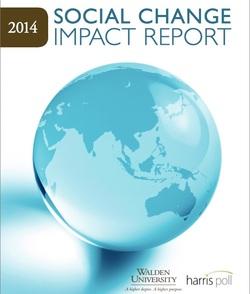
Submitted by Editorial Team
“Be the change you wish to see in the world,” is an oft-quoted statement of Gandhi. Social change indeed begins at the individual level, involving increased awareness and understanding, attitudinal change, and increased civic participation. This individual change eventually leads to the building of collective public will, and results in changes at the community, institutional and policy level.
Walden University has brought out its 2014 Social Change Impact Report that provides interesting insights into the perceptions and perspectives of people around the world who are committed to helping bring about social change. The fourth annual survey was commissioned by Walden and conducted online by Harris Poll. The survey was designed to assess the state of social change, and included the perspectives of more than 9,000 adults in Brazil, Canada, China, Germany, India, Jordan, Mexico and the United States.
The findings of the survey suggest that more people believe it is important to contribute to long-term changes than those who believe it is important to contribute to immediate changes. More social agents also believe that their efforts today contribute to positive change in the future compared with immediate changes. However, while three in four social change agents believe their contribution is making a difference, they are less likely to believe they are impacting systemic change, resulting in long-term social transformation.
Walden University president, Dr. Cynthia Baum, said that the findings of the 2014 report reveal that engagement in social change is highly valued, but a majority of contributors feel that everyone could be doing more to achieve an enduring impact. In terms of bringing behavioral change in others to contribute to improving lives, half of the adults believe they are able to make a major or moderate impact.
On average, 73 percent of adults who have ever engaged in positive social change said that is important that an individual’s involvement with positive social change today contributes to long-term changes that will improve people’s lives in the future. On the other hand, 61 percent of adults say it is important to contribute to immediate changes that improve the lives of people now. More adults also believe it is more likely their involvement today contributes to long-term change.
Importantly, the overall confidence levels of social change agents remain high, but they feel they could be doing more. 77 percent of the people, on average, say they are confident that their involvement is making a difference. However, only 27 percent of adults overall are highly satisfied with the kind of impact they are making, and as many as 24 percent are not at all satisfied. On average, only 36 percent are highly satisfied with the frequency of their engagement in positive social change activities and the impact of their contribution.
The good news is that involvement in positive social change continues to remain widespread and diverse. On average, 82 percent of the respondents reported that they have done something to engage in positive social change in the past six months. Nearly half of the people across the world engaged in social change using digital technology. Using digital technology is the top social change activity in Brazil, India, Mexico, China and Jordan. On the other hand, in Canada, Germany and the U.S., the top social change activity is donating money, goods or services.
By Vikas Vij, staff writer for the Sustainable Development news and editorial section on Justmeans. Vikas is an MBA with 20 years of managerial and entrepreneurial experience and global travel. He is the author of The Power of Money (Scholars, 2003), a book that presents a revolutionary monetary economic theory on poverty alleviation in the developing world. Vikas is also the official writer for an international social project for developing nations "Decisions for Life" run in collaboration between the ILO, the University of Amsterdam and the Indian Institute of Management.














